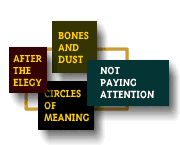
commodification?
Golumbia's discussion of Hypercapitalism, as distinct from more familiar forms of capitalism, hinges on the commodification of information represented by TCP/IP packet switching. He describes packets at great length and with evident loathing, but fails to explain how the packets commodify writing in ways that type and -- more pertinently -- alphabetic codes do not.
|
At least one reviewer assumed the repetition was a typographic
error. This quotation (Golumbia, paragraph 22) is (alas) accurate. |
| "Within that soup, the distinction between 'free' and 'for profit' becomes obscured if not lost altogether. Its seems plausible to suggest that the distinction between 'information' and 'capital' becomes obscured if not lost altogether. And the name of the soup, at least the word we have that most closely describes it today, is hypertext." |
Golumbia here rediscovers that, if information has value, it necessarily acquires an economic role: in a capitalist economy, value is capital. The intermingling of information and capital began with the development of literacy and currency. Hypertext is irrelevant to the argument, although the appearance of the term here may have led the journal's editors to hope for readers, attention, and hence accumulation of capital in their own hands.
Golumbia is shocked -- shocked! -- to discover "capitalist control and development of a new media tool." It is hard to imagine that many readers, of whatever political persuasion, would share his purported surprise.